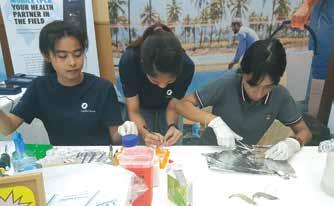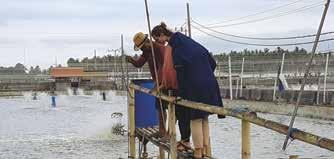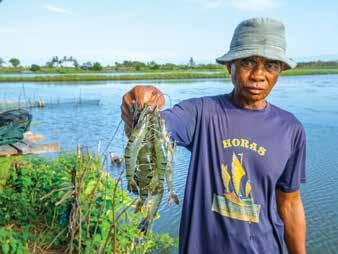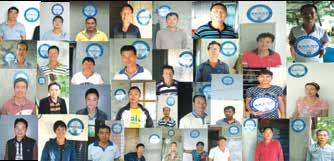
3 minute read
AIP Directory: a new one-stop shop for aquaculture improvement projects
By Anton Immink, Jenna Stoner and Paul Bulcock
Aquaculture Improvement Projects (AIPs) are gaining momentum within the seafood industry. They are an important mechanism for the supply chain to support aquaculture industries through the process of adopting more sustainable practices. But what are these projects and where are they occurring?
What are AIPs?
In short, AIPs are multi-stakeholder efforts that aim to utilise the power of the private sector to promote positive changes toward sustainability, seek to make those changes endure through 21 Responsible & Sustainable Aquaculture policy change, and improve performance at the farm and zonal scale. The characteristics of an AIP mirror the core attributes of a FIP: public supply chain commitments, published needs AIP Directory: a new one-stop shop for assessments, workplans with time-bound objectives, and regular reporting of progress.
The general concept of improvement projects is not new. Fishery improvement projects (FIPs) have existed for over 10 years and there are currently some 170 projects operating in over 60 Sharing information to support sourcing decisions countries. Improvement projects in aquaculture, however, have been slower to develop.
Dominique Gautier, Director of Sustainability at Seafresh Group, remarks that “AIPs are an important tool to drive sustainability, whether participating farms have certified responsible management practices in place or not. It is important for ensuring impact and credibility that projects have a clear set of goals and a defined workplan, and that they are publicly reporting on progress.”
Introducing the AIP Directory
A new website called The AIP Directory (www.aipdirectory. A new website called The AIP Directory (www.aipdirectory.org) has been created to serve as an org) has been created to serve as an independent, online independent, online platform to showcase active AIPs. The website is a free, online resource that allows those actively involved improvements are taking place and what progress is being made on specific project or interested in AIPs to learn where and how these improvements are taking place and what progress is being made on specific projects.
The site currently lists six active AIPs that cover three countries (China, Indonesia and Thailand) and two species (shrimp and tilapia). Gautier notes the website “gives project managers a mechanism to tell the world about their progress, and buyers and funders greater insight into what improvement projects are underway and how they can get involved”.
The AIP Directory is an initiative of the Sustainable Fisheries Partnership (SFP), but maintained as an independent, free online platform, a one-stop shop for all stakeholders in the supply chain and where seafood buyers are able to find information about active projects.
AIPs in action

In Chumphon, Surat Thani and Rayong, Thailand, the Shrimp Health Resources Improvement Project (SHRImp) is collaborating with shrimp clubs, co-ops and local governments to manage emerging disease risks and cumulative environmental impacts. https://aipdirectory.org/aip/shrimp-surat-thani/ https://aipdirectory.org/aip/shrimp-chumphon/ https://aipdirectory.org/aip/shrimp-rayong/

In East Java, Indonesia, the Shrimp Improvement Program (SIP) is piloting a suite of tools to improve governance and farm management in order to reduce risk, improve productivity, and protect natural resources. https://aipdirectory.org/aip/shrimp-east-java/

In South Sulawesi, Indonesia, the ASIC EcoShrimp project is verifying local Penaeus monodon farming practices to the ASEAN Seafood Improvement Collaborative (ASIC) shrimp protocol to promote extensive farming and reduce disease risks. https://aipdirectory.org/aip/south-sulawesi-asic-ecoshrimp/
How to be involved
As an AIP implementer, you can showcase your project and report progress. You are invited to register for free via the Directory homepage < https://aipdirectory.org/>.
If you are looking to start a new project, the AIP Directory has the tools to help you. You can find these under its Resources page <https://aipdirectory.org/resources/>. Here you will find the AIP toolkit, a step-by-step guide and a range of downloadable tools to help users develop, launch and monitor the progress of an AIP.
Visitors can also sign up for a newsletter and receive updates on all things AIP-related, including new projects, AIP progress and outcomes.
In East Java, Indonesia, the Shrimp Improvement Program (SIP) is piloting a suite of tools to improve governance and farm management in order to reduce risk, improve productivity, and protect natural resources. https://aipdirectory.org/aip/shrimp-east-java/

In Hainan China, a project under the China Blue Sustainability Institute is promoting industry associations and a code of good practice for tilapia farmers. https://aipdirectory.org/aip/hainan-tilapia/ Anton Immink is Aquaculture Director and has worked across Asia and Africa on a range of projects over the last 25 years. Email: anton.immink@sustainablefish.org
Anton Immink is Aquaculture Director and has worked across Asia and Africa on a range of projects over the last 25 years. Email: anton.immink@sustainablefish.org
Jenna Stoner is Senior Aquaculture Analyst with 15 years experience in assessing the sustainability of seafood sources. Email: jenna.stoner@sustainablefish.org
Paul Bulcock is Aquaculture Analyst, bringing 25 years of international development reporting experience. Email: paul.bulcock@sustainablefish.org
The authors are part of the aquaculture team at Sustainable Fisheries Partnership (SFP), a non-profit organisation dedicated to helping the seafood supply chain function in an environmentally friendly way, through the provision of information and the development of tools to support improvement.



